Advertisements
Advertisements
Question
Toothache
Doki : Oh! I'm in agony. I didn't sleep a wink last night!
Moki : Why don't you go to a dentist?
Doki : Even thinking about the dentist's waiting room gives me the willies.
Moki : It's because you haven't been to a dentist for ages.
Doki: What a reassuring person you are!
Moki : I'm now going to get Mom. She'll only crack the whip and make you go to the
dentist.
Doki: No, No! I'd better go with you. At least you'd save me from going into the surgery.
Moki : I can only take the horse to the water but I can't make it drink! I'm sure, you're going
to turn tail and go home.
Doki: Don't worry, I shall be led quietly into the dentist like a lamb because my tooth is so
sore.
Moki : If that happens, I would believe that wonders will never cease!
Doki: I wish I had taken proper care of my teeth!
Moki : I wish you had paid attention to the discipline that Mom had laid for all of us!
Doki: Yeah! But past can't be undone. I have to reap what I had sown.
Your teacher will read out the conversation between Doki and his
sister, Moki. As you listen complete the idioms and expressions listed below.(GIVEN ABOVE)
1. sleep…...….............………….
2. ………....……….me the willies
3. crack the…………..............….
4. take the……………….to water
5. …………...................…….tail.
6. wonders will……….........…….
7. ……………….can't be undone.
8. reap what I …………………….
Idioms are metaphorical expressions rather than literal. For example 'give someone
the willies' does not simply mean 'to handover something called willies to someone',
but 'to make someone feel nervous'. It is important for learners of English to
understand them and be able to use them.
Solution
1. sleep like a log. (sleep very well)
2. unwanted guests give me the willies (make me nervous)
3. crack the whip (use your authority)
4. take the well to water (do the opposite)
5. I know neither its head nor its tail (know nothing about it)
6. Wonders will never cease (wonders will continue to happen)
7. What has been done, can’t be undone (can’t be changed)
8. Reap what I sow. (bad result of what you did in the past)
APPEARS IN
RELATED QUESTIONS
Answer the following question briefly
Which of the following traits are relevant to the character of the narrator's grandmother?
(i) determined
(ii) selfish
(iii) emotional
(iv)mean
Give reasons for your choice.
Answer the following question briefly:
How did Private Quelch manage to anger the Corporal?
Answer the following question briefly.
Who was the passenger of chair No. 9? What did he suddenly do?
In the sixth line of the first stanza, we read:
"... and sings a melancholy strain,..."
This "s" sound at the beginning of sings and strain has been repeated. Poets often do
this. Do you know why? Do you know what this "poetic repetition" is called? Can you
find other instances of this, in The Solitary Reaper?
Answer the following question.
With reference to the poem, how can you look after your teeth?
Compounds—someone, nothing etc.
| someone | anyone | none | everyone |
| somebody | anybody | nobody | everybody |
| something | anything | nothing | everything |
| somewhere | anywhere | nowhere | everywhere |
(Words ending with one and body mean the same.)
Fill in the gaps with some of the words from the table above:
- He can’t hear _____ . He’s completely deaf.
- _______ is going blurred. I can’t see!
- He’s looked ______ but he can’t find it.
- It must be _________ ! Look carefully.
- ______ must move or the horse will be scared.
- It doesn’t matter what you wear, ______ will do.
- She is very popular. _______ likes her.
- Shh! There is _____________ moving downstairs.
- Don’t worry! It’s _________ frightening. It is only the wind.
- It’s a public holiday, so____________ is open.
In Question 3, you read an eye-witness account of a robbery. On the basis of your reading of the Birlstone tragedy, in about 125 words, write Dr Wood's account of the discovery of John Douglas's body.
Study the following graph and the accompanying report.
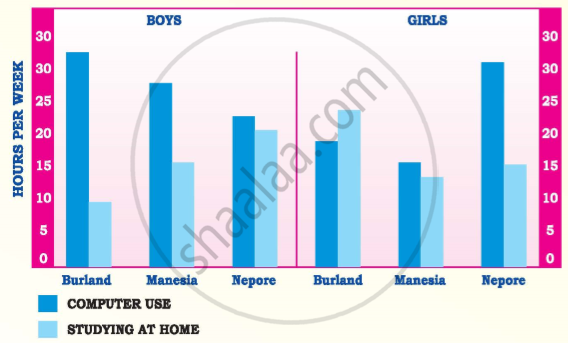
Our study of the time spent by students at the computer and studying at home in three countries has revealed some interesting facts.
First, the majority of boys and girls in the age groups of 14-16 in these countries spend more time at the computer than studying at home. Children in these countries spend an average of20-30 hours per week in comparison to 10-15 hours of studying at home. The only exception is Burland where girls spend more time studying at home than at the computer.
Secondly it is evident that in all three countries, time spent at the computer is having a serious impact on the number of hours spent studying at home. In fact, the greater the number of hours spent at the computer, the fewer number of hours are being spent studying. For example, boys in Burland spend an average of 32 hours at the computer while they spend about 8 hours studying at home.
Look at the pictures of people talking to each other. With your partners, discuss what they are telling each other. Share your ideas with the class.
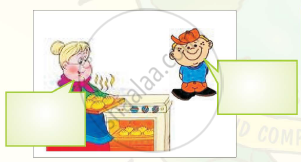
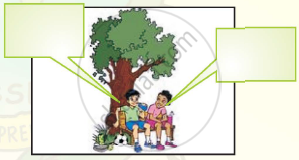
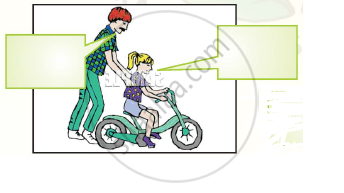
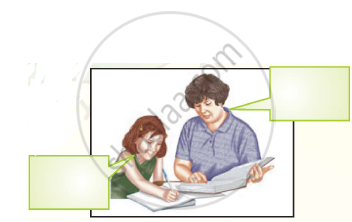
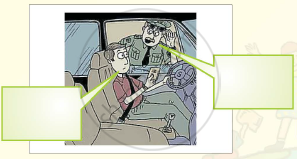

Listen to the song and check whether you have guessed right in Question 1. Listen again until you are ready to sing along with it.
